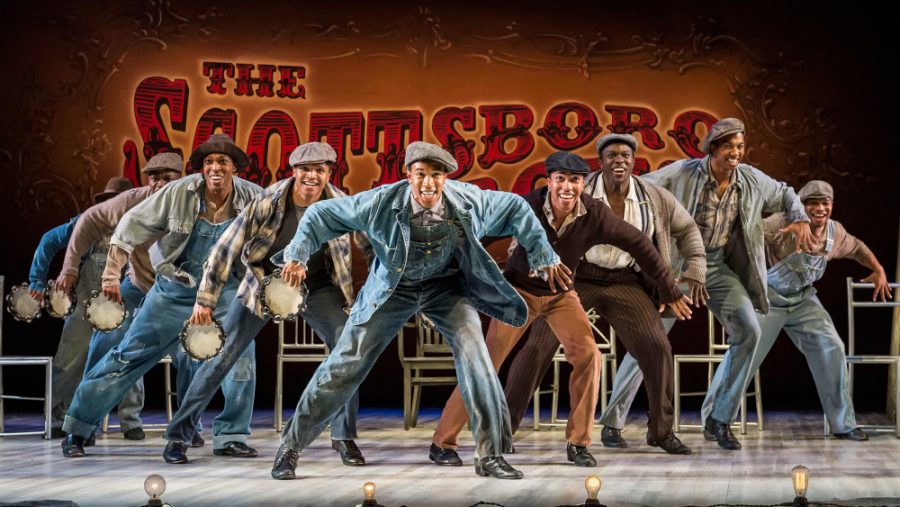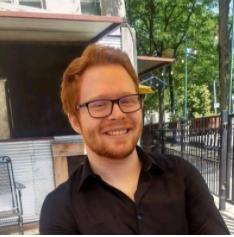Are we allowed to enjoy “The Scottsboro Boys” musical?
The musical “The Scottsboro Boys,” uses real historical events to talk about racism.
February 27, 2020
Director Jon Martinez’s production of “The Scottsboro Boys,” that ended its three-week run at the Beck Center for the Arts last Sunday, Feb. 23, challenges the (mostly white) audience to think about what theater should be and what they are allowed to enjoy. It also challenges them to remember racist atrocities of the past.
The musical, with a book written by David Thompson and music and lyrics by John Kander and Fred Ebb (who you may recognize as the duo behind “Chicago”), is framed as a minstrel show, a historical genre of theater that relies on racist stereotypes of African Americans for humor.
Such shows would feature white actors wearing blackface paint as caricatures. At the forefront of this framing device is the Interlocutor, played by Greg Violand, the only white actor in the cast and leader of a traveling minstrel troupe.
His troupe is made up of black actors, so the Interlocutor takes on the role of a sort of slave master, forcing his actors to do what he wants them to do. To him, the actors are not human. They are empty vessels for the audience’s entertainment. He is the director; what he says, goes.
Violand’s acting combines traits of a Southern gentleman and a manipulative villain. In his all-white suit, he looks like an evil Colonel Sanders as he walks across the stage.
In this case, the Interlocutor wants his actors to perform the tale of the Scottsboro Boys, the nine young African American men from 1930s Alabama who were falsely accused of raping two white women, yet punished for it, nonetheless. The show follows the journey of the nine boys from their arrival into Scottsboro via train up to the ends of their lives.
Leading the nine boys is Haywood Patterson, played by Anthony Harris, a third-year student at Baldwin Wallace University (BWU). Though he frequently shares the stage with upwards of eight other people, Harris’ large stature, charisma and booming voice fill the set and draw all eyes and ears to him, no small feat given the vast amount of other talent surrounding him.
During one trial scene, one of the Interlocutor’s assistants, Mr. Bones, played by fourth-year BWU student Nick Drake, acts as the attorney prosecuting the Scottsboro boys and asks the jury “What would our forefathers have done?”
However, there are no characters on stage that make up a jury. Instead, Bones addresses that question to the audience. As theater is an overwhelmingly white profession and art, the audience at the Beck Center opening night mostly consisted of white people (me among them). What would my forefathers have done?
People tend to praise their family and their ancestors. As a culture, we glorify the past, and a lot of people see the founders of our nation and our own families as good, wise, larger-than-life heroes. However, such views are, more often than not, fictionalized.
What would the average white person’s ancestor have done to the Scottsboro Boys? Probably what the people of Alabama did to them. Potentially even worse, in fact, depending on where and when those ancestors lived.
Bones, along with his counterpart, Mr. Tambo, played by fourth-year BWU student Charles Mayhew Miller, are especially bizarre characters. Assistants to the Interlocutor, they hold power over the Scottsboro Boys in roles such as sheriff’s deputies or lawyers. These roles are also frequently, if not always, white roles. The two are almost performing a sort of reversed minstrel show, where black actors play exaggerated versions of white characters, instead of the other way around.
Bones and Tambo also function as Uncle Tom figures, dutifully serving their white master at the expense of other African Americans around them. In a narrative that is about the suffering of young black men at the hands of white people, there is something odd and uncomfortable about seeing so many of those white people played by black actors. The victims of oppression in this show take on the role of their oppressors and, in turn, oppress their fellow people.
In another scene, Bones, acting as a prison guard, says to Patterson, “the only thing [you’ll have] left is how people will remember you.” He then follows that statement with a cruel yet honest modifier: “IF they remember you.”
When Bones makes that statement, however, he is not looking at Patterson. Instead, both he and Patterson look at the audience, who are the “they” that Bones speaks of. Bones, as well as the writers, challenges the audience to remember the story of the Scottsboro Boys. It’s our duty, as members of the privileged racial majority, to remember those who have suffered under them and to work to change the system for the better.
The framing of the musical as a minstrel show combines entertaining music and lyrics with disturbing historical realities. It also forces us to deal with more difficult questions. What are we allowed to laugh at? What are we allowed to deem as funny, and to deem as entertainment?
The show does not give a clear answer, but does leave the audience, as the director intended, “sitting there with [their] thoughts.” In the penultimate scene, the minstrel show comes full circle and the nine Scottsboro Boys come onto the stage with the Interlocutor and his two assistants for the finale. Everyone except the Interlocutor is wearing blackface, which, historically, was the makeup of choice for minstrel shows.
Instead of giving the audience a funny and happy ending like the Interlocutor wants them to, the Scottsboro Boys defy him and simply walk offstage. As the Interlocutor looks around in shock, the music dies down, leaving him alone with his assistants, Mr. Bones and Mr. Tambo.
They turn to him, crying and wipe their makeup off of their faces, as if shedding his ownership of them, his objectification of them for entertainment, and leave. The Interlocutor stands, confused, and walks off, trying to maintain his dignity.
The sight of black people in blackface was bewildering, to say the least. It was what all the previous instances of disorientation throughout the show had been leading up to. The show constantly evoked a cognitive dissonance in the audience by pairing happy, upbeat minstrel music with cruel and depressing lyrics.
The show was performed without an intermission, preventing the audience from taking a break from the difficult material, instead enduring it without escape. However, the performance didn’t drag on, allowing us to engage and fully absorb the material. Only then can we work to change the world we live in.




